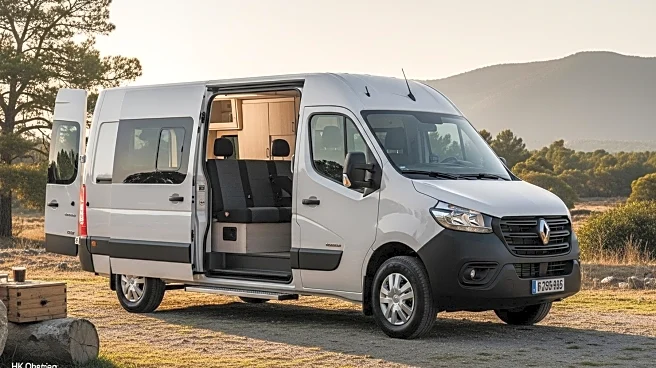What's Happening?
Fiat has introduced a unique double-cab version of its Ducato van, designed to address the growing demand for motorhomes in Europe. This innovative design features two driver cabins joined back-to-back, allowing for efficient transportation of unfinished vehicles from Fiat's plant in Atessa, Italy, to motorhome builders across Europe. The dual-cab unit can be separated at conversion workshops, where each cab is mounted onto its own rear chassis and axle, customized for specific motorhome designs. This approach, developed by Stellantis, Fiat's parent company, aims to streamline the supply chain for the booming motorhome industry. The Ducato is equipped with a 2.2-liter, four-cylinder turbo diesel engine, producing 180 horsepower, and can handle a maximum load of 4.4 tons.
Why It's Important?
The introduction of the double-cab Ducato is significant as it addresses logistical challenges faced by the motorhome industry, which is experiencing a surge in demand. By facilitating the efficient transport and customization of motorhomes, Fiat is helping to meet consumer needs and support industry growth. This development could lead to increased production capacity and faster delivery times for motorhome manufacturers, potentially boosting the European motorhome market. The innovative design also highlights Fiat's commitment to adapting to market demands and enhancing its product offerings.
What's Next?
As the motorhome industry continues to grow, Fiat's double-cab Ducato may set a precedent for other automakers to develop similar solutions. The success of this approach could encourage further innovation in vehicle design and supply chain management within the industry. Additionally, motorhome builders may explore new customization options and features to attract consumers, leveraging the flexibility offered by the double-cab design. The ongoing demand for motorhomes may also prompt Fiat and other manufacturers to expand production facilities and invest in new technologies to enhance vehicle performance and sustainability.
Beyond the Headlines
The double-cab Ducato's design may have broader implications for vehicle manufacturing and logistics. By demonstrating the feasibility of modular vehicle designs, Fiat could inspire other industries to adopt similar strategies for efficient transportation and customization. This approach may also influence the development of sustainable practices in vehicle production, as manufacturers seek to reduce waste and improve resource utilization. Furthermore, the success of the double-cab Ducato could lead to increased collaboration between automakers and conversion workshops, fostering innovation and growth in the motorhome sector.











